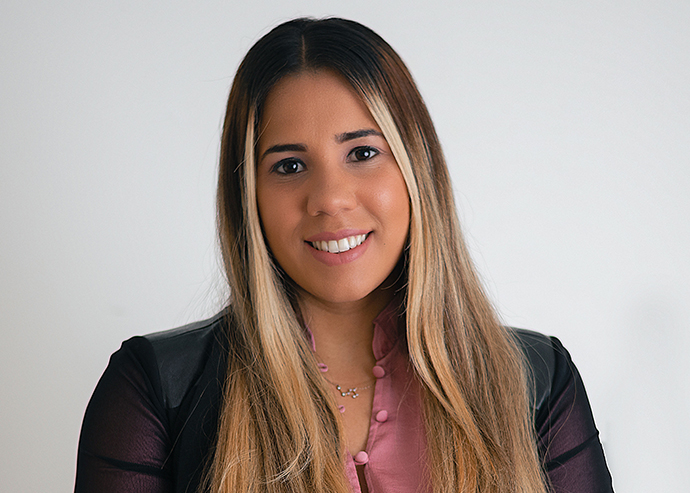
Bachelor of Applied Arts and Sciences, University of Pennsylvania ‘23; Concentration in Physical and Life Sciences
Associate in Applied Science, Dental Hygiene, Northampton Community College ‘14
Dental hygienist Cynthia Gonzalez was undecided about her professional future when she enrolled in the Bachelor of Applied Arts and Sciences (BAAS) program. Since starting an oral health career five years earlier, her plan had been to return to school for her bachelor's degree, then prepare for dental school. Through her experience at Penn LPS Online, she now sees a broader horizon for pursuing her passion for service and patient care.
"I enjoy helping people and teaching them about their oral health," she shares, reflecting on her career so far. During her time with Penn Dental, Cynthia treated patients in a family practice, supervised and trained dental students, and served in community clinics across Philadelphia. In early 2020, for example, she assisted Penn Dental Community Care Programs in putting together a dental clinic with partner organization Puentes De Salud, a nonprofit serving Philadelphia's Latinx immigrant community. "I grew up in the Dominican Republic, so being Latino myself, I like giving back," she explains. "The project was a good way to support people in need and grow as a professional. But I was still undecided about what I wanted to do next." Returning to school would help her decide.
Penn's online asynchronous program allowed Cynthia, a working parent, to fit school into an already-demanding schedule. She started her BAAS program in 2019 with 10 transfer credits of previous coursework. "That was important," she says, "because as a mom working full time, I knew I could only take maybe two courses a semester, and it would take a long time to finish without the transfer credits." Once classes started, Cynthia found many of her fellow students were also balancing family, work, and school. "We get to know each other pretty well through the discussion boards," she says, referring to the online forum where students post work, share ideas about assignments, and build community. "It's hard juggling so many things, but just knowing you're not alone is helpful. If you see other people doing it, you can do it."
Occasionally, students and instructors even get the chance to meet each other's families during optional live video chats or office hours. "My nine-year-old son, Armando, is understanding when I say I have to be in class for an hour, but he still likes to pop on camera and say 'hi' to the professor or other students," she says, laughing. "I enjoy seeing all the family that comes on camera. That's our life as working professionals and parents."
When her work schedule was tight, Cynthia found she could get ahead in courses where online assignments were released early. Other times, she'd discuss scheduling conflicts with a professor and work out an extension. And her academic advisor is actively in touch to keep Cynthia on track with degree requirements while fitting in interesting electives. Once her daughter, Luna, was born in 2021, Cynthia took some time off from work but continued to take classes—something that might not have been possible in a traditional in-person program.
For her concentration, Cynthia chose Physical and Life Sciences. "I'm a science person," she says, noting her community college coursework included anatomy, microbiology, and chemistry. The Penn offerings, however, brought new subjects to her attention. She has already completed the neuroscience course block (a focused course of study within a concentration) and is working to complete the climate change course block, which will earn her certificates in both subjects when she finishes her degree. "I may also finish the Certificate in Global and Regional Studies," she adds, noting she appreciates the certificates are something extra she can add to her resume.
This coursework has settled an important question for her. "Going to dental school is no longer the goal," she shares. "I see there are other things I can do with my degree and different fields I can work in to help people."
For example, in a recent global studies course, Contemporary Issues in Global Health, Cynthia learned about the complex interconnection of social, economic, and political forces behind global health inequities. And she was able to bring her own experiences in oral health—a vital yet overlooked area of human health—to class discussions around structural violence and unequal access to basic care. Climate change coursework opened her eyes to the urgent environmental challenges people are facing in the US and around the world. "Those classes made me want to give back to the planet and make the world better," she says.
Cynthia has only four courses left to complete her degree, which she plans to finish over the next academic year. "I think it will feel good to graduate. I will feel accomplished," she says. She plans to attend the 2023 graduation ceremony on campus with her family and is especially excited to share the experience with Armando. "I think it will be a good example for him. He has seen me working and going to school—I feel that will motivate him to be a good student and hopefully go to college and find a profession," she says. Though it has taken her a few years to get this far, Cynthia is happy with the pace she set for herself. "It's not a race," she notes. "It's important to take the time to learn about yourself, what you like, and what you want to do," she advises.
For now, she has returned to a part-time dental hygienist position treating underserved communities at Esperanza Health Center in the Kensington neighborhood of Philadelphia. "I'm still going to be in the dental care field for a while until I decide what else opens up after I graduate," she says. "I'm looking forward to seeing what I can do in my profession. I want to continue helping people, either in the local community or globally—I want to be a good global citizen."
